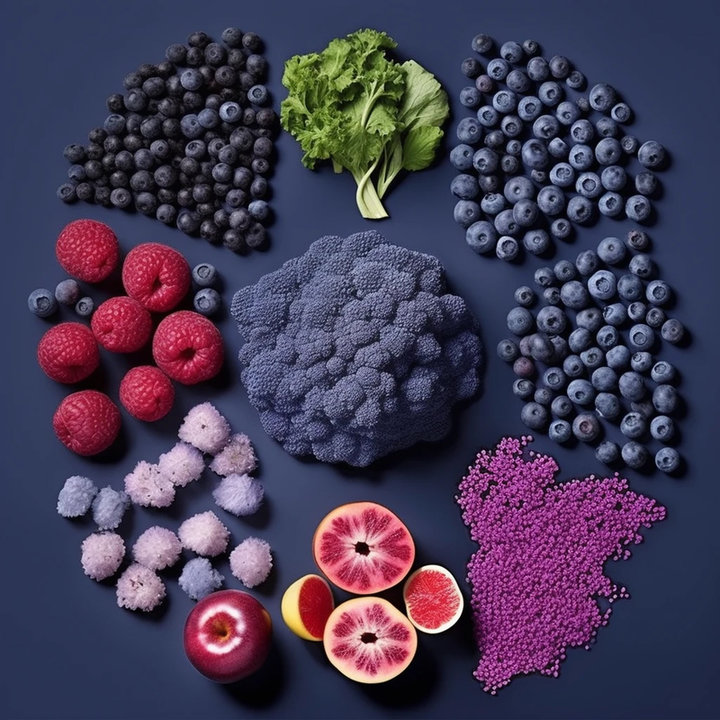KEYWORDS
Microbiome
Gut microbiome
Botanicals
Polyphenols
Brain
Skin
Metabolic
Joint
Immunity
Abstract
For thousands of years plants (botanicals) have been used for their medicinal and health changing benefits (1). Plants continue to serve as a valuable source of therapeutic compounds because of their phytochemical and nutritional makeup. These phytochemical components come with a variety of mechanisms of action which provide a collective health benefit. (2) We now see that these same plants can play a large role in gut health, microbiome, and the gut____-axis. The ____ (blank) can stand for: brain, immune, joint, metabolic, oral, skin and many other less popular topics (3). In this mini-review of the scientific research with botanicals and their impact on the gut, we will identify that botanicals have both direct and indirect impact on the gut, microbiome and the gut-____-axis such as those mentioned above.
Introduction
There are some fantastic ingredients if we take a closer look at the botanicals that directly impact gut health. Generically speaking, botanicals such as artichoke, chamomile, ginger, green tea, and turmeric are all regularly considered beneficial with regards to different facets of gut health or the microbiome.
- Artichoke- Several clinical trials in patients with functional dyspepsia or dyspepsia associated with biliary disease show that taking artichoke leaf extract can reduce symptoms such as nausea, vomiting, flatulence, and abdominal pain. (4,5)
- German Chamomile- Chamomile is used traditionally for numerous gastrointestinal conditions, including digestive disorders, spasms, upset stomach, flatulence, ulcers, and gastrointestinal irritation. (6) Studies in preclinical models suggest that chamomile inhibits Helicobacter pylori. (7)
- Ginger- Short-term intake of ginger juice had substantial effects on the composition and function of gut microbiota in healthy people. (8) Ginger also possesses carminative effect, decreases pressure on lower esophageal sphincter, reduces intestinal cramping, and prevents dyspepsia, flatulence, and bloating. (9)
- Green Tea- Green tea can influence the gut microbiota by either stimulating the growth of specific species or by hindering the development of detrimental ones. At the same time, gut bacteria can metabolize green tea compounds and produce smaller bioactive molecules. Accordingly, green tea benefits could be due to beneficial bacteria or to microbial bioactive metabolites. (10)
- Turmeric (Curcumin)- Turmeric which is high in curcumin has shown to positively modify the gut microbiota, favors beneficial bacteria strains, supports the intestinal barrier function, and decreases gut inflammation. (11)
The above examples are just the tip of the botanical iceberg for botanicals with proven gut health benefits.

Semi-direct impact: polyphenols and gut health
While the above botanical examples showed a direct impact on gut health and the microbiome, the following are examples of botanicals which not only have compounds which are known to support gut health, they also have studies showing their benefit on the blank as part of the gut-BLANK-axis. A perfect example are those botanicals high in polyphenols. Why? Polyphenols are great prebiotics. (12) An example is the polyphenols from grapes. Here are powerful statements to encourage using polyphenols in a microbiome-supporting product. (13,14,15)
- Polyphenols from grapes are NOT well absorbed and, therefore, reach the colon in an unaltered form (prebiotic effect)
- The effect of polyphenols on the intestinal microbiota is achieved by influencing the growth and metabolism of bacteria (prebiotic activity).
- Recent studies demonstrated the beneficial effect of grape polyphenols by stimulating bacteria such as Akkermansia muciniphila (AM). AM has positive influences in several areas that influence weight management (for example, insulin resistance.)
- Red grape extract or grape seeds were observed to have many benefits by increasing important probiotics such as Lactobacillus reuteri, Lactobacillus acidophilus, Clostridiales, and Ruminococcus. (A positive impact on the microbiome)
While these are all related to grape polyphenols, research shows that polyphenols, in general, not just those from grapes, have a positive impact on the gut. (16) Let’s look at some ingredients that fit the polyphenol model and have research in other areas related to gut health.
Gut-brain-axis
A great example of a grape extract for our conversation is Cognigrape. Cognigrape is high in the polyphenols anthocyanins and proanthocyanidins and can improve cognitive performance in elderly people by acting on attention and immediate and delayed memory. (17)
Gut-joint-axis
Turmeric/Curcumin (HydroCurc®) is a perfect example for the joint health category; not only is HydroCurc® (turmeric/curcumin) high in polyphenols, but it has multiple clinical studies showing its benefits for joint health and discomfort. (18)

Gut-immune-axis
For this ingredient, we will go to the Mediterranean and Olivactive. Olivactive is derived from olive leaves, which are also high in polyphenols. (19) Olivactive is high in oleuropein, a powerful polyphenol that research has shown is a powerful antioxidant and impacts the immune system in multiple pathways. (20)
Gut-metabolic-axis
We will stay in the Mediterranean again with the ingredient Morosil (red moro orange). Red Moro oranges are high in anthocyanins (polyphenols), and research completed with Morosil shows it impacts body weight, waist circumference, and hip circumference. (21)
Gut-skin-axis
We will see amla listed if we refer to the list of ingredients with specific effects on gut health. Amla is also high in polyphenols, and research shows it is an excellent skin health, primarily in control of collagen metabolism. (22)
Conclusion
The growing body of evidence showing that botanicals play an important role directly on gut health and the microbiome is promising. With new research stating the impact of botanicals high in polyphenols on gut health and the microbiome leads us to ask the question, why not combine botanicals with probiotics to achieve a better outcome for the gut, and gut-blank-axis health concerns? Based on the growing body of evidence, botanicals should be considered a primary way to support both gut and gut-blank-axis health concerns.
References and notes
- Raskin I, Ripoll C. Can an apple a day keep the doctor away? Curr Pharm Des. 2004;10:3419–29. https://pubmed.ncbi.nlm.nih.gov/15544525/
- Schmidt B, Ribnicky DM, Poulev A, Logendra S, Cefalu WT, Raskin I. A natural history of botanical therapeutics. Metabolism. 2008 Jul;57(7 Suppl 1):S3-9. doi: 10.1016/j.metabol.2008.03.001. PMID: 18555851; PMCID: PMC2981029. https://pubmed.ncbi.nlm.nih.gov/18555851/
- Bull MJ, Plummer NT. Part 1: The Human Gut Microbiome in Health and Disease. Integr Med (Encinitas). 2014 Dec;13(6):17-22. PMID: 26770121; PMCID: PMC4566439.
- Kraft K. Artichoke leaf extract- recent findings reflecting effects on lipid metabolism, liver and gastrointestinal tracts. Phytomedicine 1997;4:369-78.
- Marakis G, Walker AF, Middleton RW, et al. Artichoke leaf extract reduces mild dyspepsia in an open study. Phytomedicine 2002;9:694-9.
- Srivastava JK, Shankar E, Gupta S. Chamomile: A herbal medicine of the past with bright future. Mol Med Rep. 2010 Nov 1;3(6):895-901. doi: 10.3892/mmr.2010.377. PMID: 21132119; PMCID: PMC2995283.
- Srivastava JK, Shankar E, Gupta S. Chamomile: A herbal medicine of the past with bright future. Mol Med Rep. 2010 Nov 1;3(6):895-901. doi: 10.3892/mmr.2010.377. PMID: 21132119; PMCID: PMC2995283.
- Wang X, Zhang D, Jiang H, Zhang S, Pang X, Gao S, Zhang H, Zhang S, Xiao Q, Chen L, Wang S, Qi D, Li Y. Gut Microbiota Variation With Short-Term Intake of Ginger Juice on Human Health. Front Microbiol. 2021 Feb 23;11:576061. doi: 10.3389/fmicb.2020.576061. PMID: 33708178; PMCID: PMC7940200.
- Nikkhah Bodagh M, Maleki I, Hekmatdoost A. Ginger in gastrointestinal disorders: A systematic review of clinical trials. Food Sci Nutr. 2018 Nov 5;7(1):96-108. doi: 10.1002/fsn3.807. PMID: 30680163; PMCID: PMC6341159.
- Pérez-Burillo S, Navajas-Porras B, López-Maldonado A, Hinojosa-Nogueira D, Pastoriza S, Rufián-Henares JÁ. Green Tea and Its Relation to Human Gut Microbiome. Molecules. 2021 Jun 26;26(13):3907. doi: 10.3390/molecules26133907. PMID: 34206736; PMCID: PMC8271705.
- Scazzocchio B, Minghetti L, D'Archivio M. Interaction between Gut Microbiota and Curcumin: A New Key of Understanding for the Health Effects of Curcumin. Nutrients. 2020 Aug 19;12(9):2499. doi: 10.3390/nu12092499. PMID: 32824993; PMCID: PMC7551052.
- Wang X, Qi Y, Zheng H. Dietary Polyphenol, Gut Microbiota, and Health Benefits. Antioxidants (Basel). 2022 Jun 20;11(6):1212. doi: 10.3390/antiox11061212. PMID: 35740109; PMCID: PMC9220293.
- Plamada D, Vodnar DC. Polyphenols-Gut Microbiota Interrelationship: A Transition to a New Generation of Prebiotics. Nutrients. 2021 Dec 28;14(1):137. doi: 10.3390/nu14010137. PMID: 35011012; PMCID: PMC8747136.
- Jian H, Liu Y, Wang X, Dong X, Zou X. Akkermansia muciniphila as a Next-Generation Probiotic in Modulating Human Metabolic Homeostasis and Disease Progression: A Role Mediated by Gut-Liver-Brain Axes? Int J Mol Sci. 2023 Feb 15;24(4):3900. doi: 10.3390/ijms24043900. PMID: 36835309; PMCID: PMC9959343
- Holtmann G, Adam B, Haag S, et al. Efficacy of artichoke leaf extract in the treatment of patients with functional dyspepsia: a six-week placebo-controlled, double-blind, multicentre trial. Aliment Pharmacol Ther 2003;18:1099–105
- Wang X, Qi Y, Zheng H. Dietary Polyphenol, Gut Microbiota, and Health Benefits. Antioxidants (Basel). 2022 Jun 20;11(6):1212. doi: 10.3390/antiox11061212. PMID: 35740109; PMCID: PMC9220293.
- Calapai et al., 2017 A Randomized, Double blinded, Clinical Trial on Effects of a Vitis vinifera extract on Cognitive Function in Healthy Older Adults. Front. Pharmacol. 8:776.
- David Briskey, Georgia Roche, Amanda Rao; The Effect of a Dispersible Curcumin (HydroCurc®) Compared to a Placebo for Reducing Joint Pain in an Adult Population – A Randomised, Double-Blind Study. Complement Med Research 9 December 2022; 29 (6): 429–436
- Barbaro B, Toietta G, Maggio R, Arciello M, Tarocchi M, Galli A, Balsano C. Effects of the olive-derived polyphenol oleuropein on human health. Int J Mol Sci. 2014 Oct 14;15(10):18508-24. doi: 10.3390/ijms151018508. PMID: 25318054; PMCID: PMC4227229.
- Barbaro B, Toietta G, Maggio R, Arciello M, Tarocchi M, Galli A, Balsano C. Effects of the olive-derived polyphenol oleuropein on human health. Int J Mol Sci. 2014 Oct 14;15(10):18508-24. doi: 10.3390/ijms151018508. PMID: 25318054; PMCID: PMC4227229.
- Briskey D, Malfa GA, Rao A. Effectiveness of "Moro" Blood Orange Citrus sinensis Osbeck (Rutaceae) Standardized Extract on Weight Loss in Overweight but Otherwise Healthy Men and Women-A Randomized Double-Blind Placebo-Controlled Study. Nutrients. 2022 Jan 18;14(3):427. doi: 10.3390/nu14030427. PMID: 35276783; PMCID: PMC8838101.
- Fujii T, Wakaizumi M, Ikami T, Saito M. Amla (Emblica officinalis Gaertn.) extract promotes procollagen production and inhibits matrix metalloproteinase-1 in human skin fibroblasts. J Ethnopharmacol. 2008 Sep 2;119(1):53-7. doi: 10.1016/j.jep.2008.05.039. Epub 2008 Jun 6. PMID: 18588964



